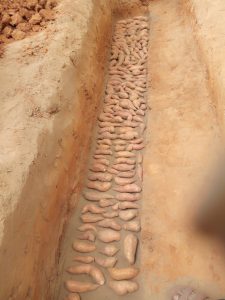
In July 2018 Issahaq Suleman, International Potato Centre’s (CIP) “Triple S” scaling champion in Ghana, paid a visit to Damongo Agricultural College in the West Gonja district of Northern Ghana, with the goal of advocating for practical training on farming improved varieties of orange-fleshed sweetpotato (OFSP).
He also wanted to introduce the college to the use of Triple S technology, to conserve roots and generate quality planting material after a long dry season such as was experienced in Northern Ghana.
Damongo Agricultural College is one of the five colleges in the country that train agricultural extension agents. It offers both certificate and diploma courses and currently boasts of 224 students who undergo training over a period of two years.
The Orange-Fleshed Sweet Potato (OFSP) Compact of Technologies for African Agricultural Transformation (TAAT) is partnering with the “Triple S” scaling project in Ghana. “Triple S” is funded by the RTB Scaling Fund while TAAT OFSP is an African Development Bank (AfDB) programme.
Led by the International Potato Center (CIP), the compact partners with stakeholders in eight countries located in Central, East, Southern and West Africa. The compact is presently leading efforts at strengthening sector-wide human and institutional capacity to integrate OFSP into African Food Systems and Markets for increased incomes.
The TAAT OFSP compact aspires to transfer post-harvest management of OFSP and innovative technologies to increase the availability of seeds in all areas including the dry areas that have a prolonged dry season. This, according to Suleman, can be achieved if the technologies are taught as a curriculum to the extension agents.
“The agricultural extension agents (AEA) are government agents who work with farmers to continuously train farmers on good agricultural practice and new technologies,” he added.
During Suleman’s visit to Damengo college, he explained the advantages of OFSP for food and nutrition security, and the availability of improved varieties recently released by the national research institution, Council for Scientific and Industrial Research – Crops Research Institute (CSIR – CRI) with the support of TAAT.
These improved varieties increase yields when coupled with better agronomic technologies.
The Triple S technology
One of the biggest hurdles in sweet potato production is getting planting material at the onset of rainfall in sufficient quantities. The Triple S is one of the technologies that is being rolled out by TAAT to meet this challenge.
It allows farmers to have quality planting material in sufficient quantities, in time for the planting season. Traditionally, roots are conserved by burying them in the field which exposes them to weevils, this in turn affects the quality of the planting material generated.
Damongo Agricultural College was receptive to the technology and with a go-ahead from the Ministry of Food and Agriculture (MoFA), an initial training was conducted.
126 students and 8 tutors were involved in the training that was delivered through printed material, instructional videos and hands-on demonstration of the innovation.
The students cultivated an acre of OFSP on the College premises after the training in August 2018.
By November, the roots were ready for harvesting and sorting for storage. TAAT OFSP Compact then organized training on how to harvest, select and store OFSP in the sand (in a pit or a basin).

Recently, participants at the annual Triple S review and planning meeting, held in Tamale from the 22nd – 24th of January 2019, visited the institution as part of a learning journey[1] to engage with the students and tutors on their experience with the Triple S technology.
“The course was very interesting and will have a good impact, because we watched videos, clearly describing the technologies, followed by practical training. This was the first time we were shown a video, which helped us to quickly understand the innovation and apply it practically. We learned a lot about the nutritional benefits of OFSP and how one can store roots up to 4 months by sorting out the damaged roots, arranging the good roots in a sandpit or basin and monitoring them on a monthly basis” said Yakubu Muzanin, a second-year student at the College.
Richard Dantey, a tutor at the College, told the visiting group that they have developed courses which address OFSP and the Triple-S innovation namely: roots and tubers crops, post-harvest and storage technology, farm-led nutrition, and practical cookery.
The students now have a full understanding of the technology and have identified income generating opportunities they can engage in such as producing vines for sale to farmers and roots for sale to processing plants. Interestingly, the male students are more inclined to the production of vines while the female students favor roots production.
Richard Annobil, Director of Human Resources and Capacity Building at MoFA, who was also one of the participants in the learning journey; has become an advocate for OFSP and Triple-S at the national level. He proposes adaptation and dissemination of course materials to the three other agricultural colleges, as well as five farming training institutes in Ghana. This will help in the sustainable integration of OFSP and Triple-S into the national education system.
He promised to support the International Potato Center (CIP) led TAAT OFSP project and Damongo Agricultural College participate in the national revision of curricula for agricultural training, an exercise scheduled for July 2019, so that they would make the case for incorporation of the Triple S technology to other stakeholders.
Getting OFSP and Triple-S into the national agricultural training curricula is key to encouraging self-scaling of this technology without additional financial support from projects. Another key factor for success is getting these innovations into the annual work plans of the regional and district levels development plans, so that budget is available for dissemination in the future.
“With such a strong partnership and clear benefits of OFSP and the Triple S innovation for food and nutrition security, as well as business opportunities in Ghana, the sky is the limit!” concluded Richard Annobil (MoFA).

